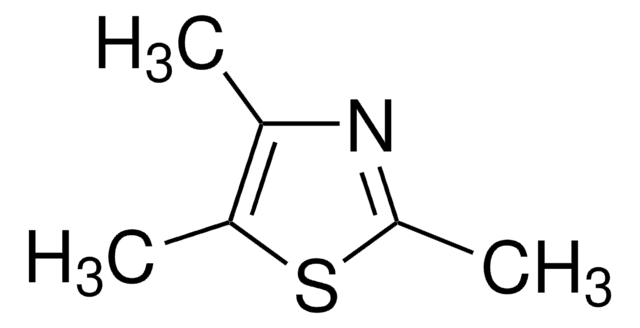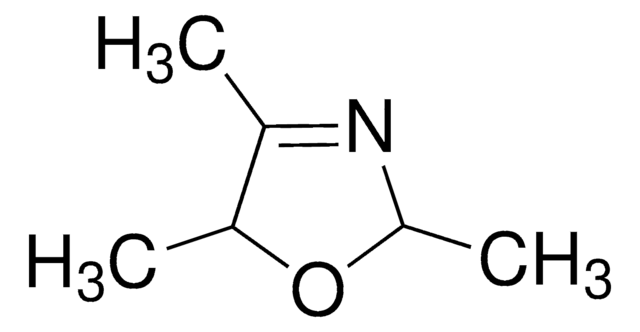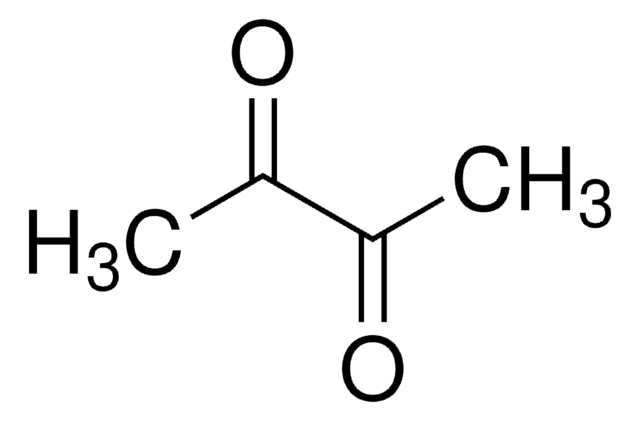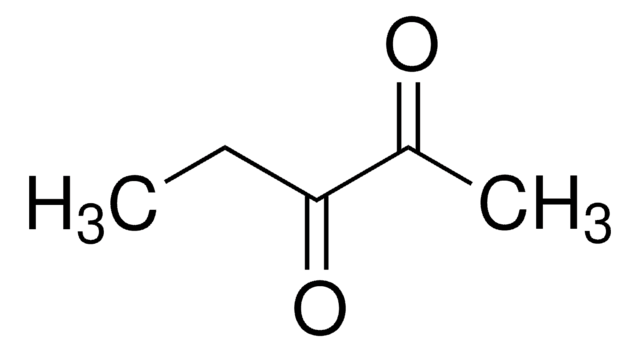All Photos(1)
About This Item
Empirical Formula (Hill Notation):
C6H9NS
CAS Number:
Molecular Weight:
127.21
EC Number:
MDL number:
UNSPSC Code:
12352100
PubChem Substance ID:
NACRES:
NA.22
Recommended Products
Quality Level
Assay
98%
form
liquid
refractive index
n20/D 1.509 (lit.)
bp
166-167 °C/717 mmHg (lit.)
density
1.013 g/mL at 25 °C (lit.)
SMILES string
Cc1nc(C)c(C)s1
InChI
1S/C6H9NS/c1-4-5(2)8-6(3)7-4/h1-3H3
InChI key
BAMPVSWRQZNDQC-UHFFFAOYSA-N
Looking for similar products? Visit Product Comparison Guide
General description
2,4,5-Trimethylthiazole is a volatile oxidant and was isolated during microwave-induced L-cysteine/D-glucose Maillard model system.
Application
2,4,5-Trimethylthiazole was employed as internal standard in the gas chromatographic determination of aldehydes in alcoholic beverages.
Signal Word
Danger
Hazard Statements
Precautionary Statements
Hazard Classifications
Acute Tox. 4 Oral - Eye Dam. 1 - Flam. Liq. 3 - Skin Irrit. 2 - STOT SE 3
Target Organs
Respiratory system
Storage Class Code
3 - Flammable liquids
WGK
WGK 3
Flash Point(F)
132.8 °F - closed cup
Flash Point(C)
56 °C - closed cup
Personal Protective Equipment
dust mask type N95 (US), Eyeshields, Gloves
Choose from one of the most recent versions:
Already Own This Product?
Find documentation for the products that you have recently purchased in the Document Library.
Volatile antioxidants formed from an L-cysteine/D-glucose Maillard model system.
Eiserich JP, et al.
Journal of Agricultural and Food Chemistry, 40(10), 1982-1988 (1992)
David J Harrison et al.
Frontiers in neuroscience, 14, 313-313 (2020-04-23)
Preclinical mental health research relies upon animal models, and whilst many encouraging advances are being made, reproducibility and translational relevance may be limited by sub-optimal testing or model choices. Animal behaviors are complex and test batteries should be designed to
Gas chromatographic analysis of aldehydes in alcoholic beverages using a cysteamine derivatization procedure.
Lau MN, et al.
American Journal of Enology and Viticulture, 50(3), 324-333 (1999)
Julien Brechbühl et al.
Frontiers in behavioral neuroscience, 7, 193-193 (2013-12-25)
The mouse Grueneberg ganglion (GG) is an olfactory subsystem located at the tip of the nose close to the entry of the naris. It comprises neurons that are both sensitive to cold temperature and play an important role in the
Emmanuel Galliot et al.
Behavioural processes, 90(2), 161-166 (2012-01-18)
Odors can have repulsive effects on rodents based on two complementary adaptive behaviors: the avoidance of predator odors (potentially dangerous) and the avoidance of trigeminal stimulants (potentially noxious). The present study aimed to compare the behavioral effects on mice of
Our team of scientists has experience in all areas of research including Life Science, Material Science, Chemical Synthesis, Chromatography, Analytical and many others.
Contact Technical Service









